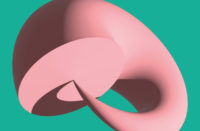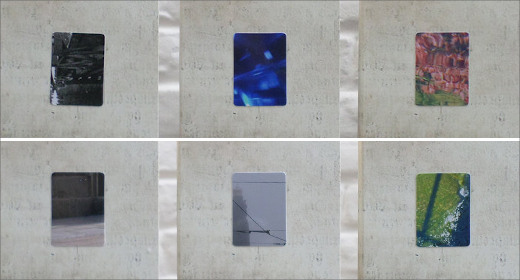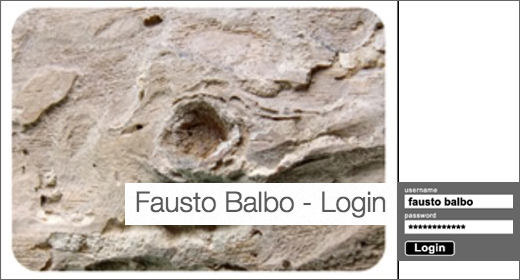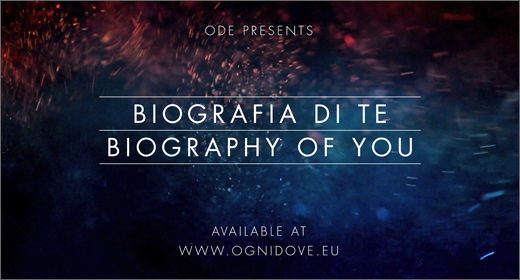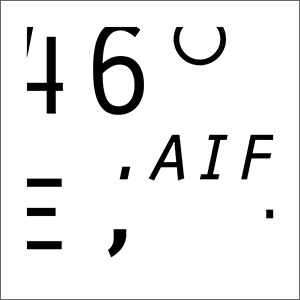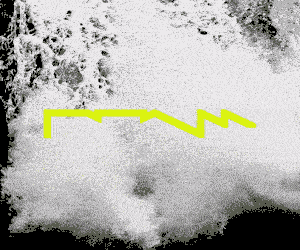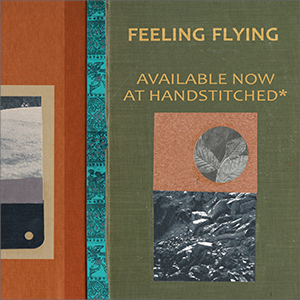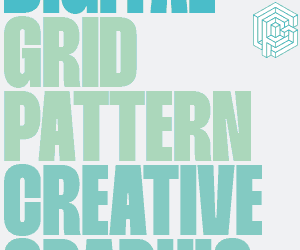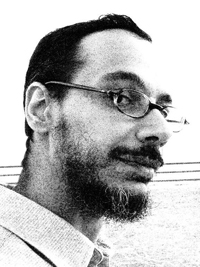
(06.27.06) FOR the past eleven years Andrea Marutti has been the founder of Afe Records (Another Friendly Edition) based out of Milan, Italy. With a focus on experimental electronic music he has represented countless artists including formidable acts like: Steve Brand, Telepherique, Ellende, Aidan Baker, Raffaele Serra, Ultra Milkmaids, De Fabriek, Maurizio Bianchi and Maeror Tri. With few household names, the unknowns he delivers trademark an edgy tapestry of aural experience, dealing in the dark and atmospheric as well as the mutated obtuse. Some of his artists, though seen as part of an underground movement, have been quite prolific over many years. After having released a ten-year anthology in 2005, Marutti, an artist in his own right, shows no signs of slowing. Here’s what we discussed…
TJ Norris :: It is a real pleasure to have the opportunity to speak with you about Afe. How are things going in your lovely country these days? In particular at Afe headquarters.
Andrea Marutti :: It’s my pleasure, thank you. Springtime is here, days are getting longer, Mr. Berlusconi is hopefully gone forever and I’m fine. Recently I’ve been very busy working on the latest releases which were out in late April. There were 15 of them all together this time: for many months I focused only on the “celebrations” for the Afe’s tenth anniversary (…a big party and a huge on-line compilation which involved more than 250 musicians / bands…) so I needed to make up for “lost” time somehow… It was great to see all the items finished and to notice how quickly they are spreading. I guess that there will be another “bunch of 15” next time!
TJN :: Phew! You’ve now been at it going on a dozen years. What motivates you and how did you start the label?
AM :: My only motivation is a passion for music, I can’t find any others even if I tried. Afe is my own creature, something that I’m really proud of. Basically it’s me doing most of the work: masters, graphics, website, etc. Afe started in 1995 when I released a few tapes of my own music on purpose of gifting some friends with them. The label didn’t have a name then, but as soon as I had the chance to release other people’s music I was forced to find one. I chose Afe (which stands for “Another Friendly Edition”) to clearly state the label’s attitude.
TJN :: And that you are – even when it comes to project like “The Bear Box” from a few years back which was something of a tome, a real full listening experience, and with all the surprise treats that came along with it, made for an interesting collectable. Do you see many of your recordings as being that way, music not really for the masses.
AM :: Well, only a few of the Afe releases were published as regular CDs. As you surely know, most of them are released in regular / special packages and are usually limited to 100/150 copies. I guess that 99% of the Afe releases are not for the masses, just because of the limited number of copies. Despite the high quality – both of the music and of the packages – Afe is just a sort of “evoluted” DIY thing: I would not be able to release “music for the masses” just because I would not have enough spare time to do it. I’m often asked why I don’t turn Afe into an “official” label and release only CDs made by established experimental artists… I guess I learned something during all these years and I could easily turn Afe into a sort of business, but this is not what I’m interested in. I prefer to keep on releasing obscure music and keep everything on the same friendly level as I always did. By the way, the “Teddy Bear Remix Project” took about three years to be finished, the box-set was limited to 100 numbered copies, more than 60 musicians / bands contributed a track and all of them received their own free copy: this is a nice example of the Afe spirit.
TJN :: It’s much appreciated you know. I’m quite curious about the prolific nature of your operation; especially since you press such limited editions. How do you manage this on your own – or do you have a staff? And is this what you do full time?
AM :: No, there is no staff at all. Some friends of mine give me some help on specific releases making graphics / artworks; sometimes the musicians/bands featured on Afe provide their own graphics, but otherwise it’s me doing everything. Discs are still home-burned at Afe headquarters one by one. Once I also used to print graphics and disc labels by myself, nowadays it would be impossible so I have them digitally printed at a local printing facility. All items are assembled by me, there is a little bit of the Afeman’s DNA on each copy… I used to have a regular job for many years, unfortunately at the moment I’m unemployed. Maybe that’s the reason why I was able to release 15 discs at the same time… Anyway, Afe can’t be seen as a “job”: most of the income are re-invested in further releases and what remains is inadequate to pay for a living, even for the poorest one I can imagine.
TJN :: The nature of the arts it has seemed historically to a great degree. Tell me about your demographic, the people that listen to Afe. Are they worldwide or do you see mostly folks in Europe buying your wares?
AM :: Afe releases are distributed almost worldwide, I would say that 50% of them are spread across Europe, 40% find their way to the USA / Canada and the other 10% in Japan and the rest of the world. Sadly there are only few people interested in Afe releases in Italy.
TJN :: How did you link up with Maeror Tri (now Troum)?
AM :: I got in touch with Stefan Knappe in the mid ’90s when I sent him a couple of Amon tracks for a 7″ release in the Drone Records series. When I started publishing stuff on Afe, Stefan was so kind to include the label’s releases in the big Drone Records mail-order catalogue. We always stayed in touch during all these years and Drone is still distributing Afe releases. Maeror Tri’s “Peak Experience” was released as a collaboration between Afe and Blade Records in 2005.
TJN :: It’s one of the eighth wonders! When you are listening to a demo, what are you waiting for? Are there certain elements that are completely essential to what ends up on your imprint? What basic characteristics in tone or harmony or lack thereof would make something interesting to your ear?
AM :: Uhm, truly I don’t know… I enjoy almost every style of electronic music and this obviously reflects on the choices I make for Afe. In the Afe catalogue there is room for everything from Ambient / Dark-Ambient to IDM / Electronica, from Industrial to Avant garde. If it’s well-produced and sounds good there is chance that I’m interested into it. Let’s say that I’m not a great fan of Power Electronics and harsh stuff, sorry. Anyway, I’m currently trying to discourage people from sending me demos because I’m quite busy and I already have releases planned for an awful lot of time, until late 2007 and even more, probably.
TJN :: You started by releasing tapes back in the day, correct? Did you evolve out of what can only be termed as “cassette culture” (like mail art before it)?
AM :: That’s right, I started with tape releases. I think that all labels producing mostly CD-Rs are the natural continuation of the tape network / cassette culture. Net-labels are probably the most up to date step of this evolutionary process. Personally I’m still fond of “physical-releases” even thought I had a few mp3 releases, both of my own music and on Afe.
TJN :: I’m down with that. I acknowledge the object as somewhat indispensable. Beyond the “ownership thing” there’s also this sense of the senses of touch and flipping through cover art and liner notes you just don’t get online. About your own work; you have recorded original material and remixed others, right?
AM :: I began my experiments with electronic music in the early ’90s using tapes and concrete elements. A few years later I also began to use synthesizers, samplers and other electronic devices, and founded the Lips Vago Digital Studio. My most well-known projects are Amon and Never Known. Several releases of Ambient / Dark Ambient music were published by labels such as Eibon Records, Amplexus, Drone Records, Taalem, etc. on CD and other medias. I am also responsible for many other projects dealing with different styles of electronic music ranging from Lo-Fi / Weird / Cheap Electronica to IDM (Wolkspurz & Ramirez, Lips Vago), Dada / Noise / Non-sense (Spiral). Recently I also started recording and releasing music under my own name. Over the years I had the chance to collaborate with many friends / musicians / artists including Nimh, Nefelheim, Madame P, Aidan Baker, Dronaement, Krell, Femina Faber, Raffaele Serra and others.
TJN :: Do you play live?
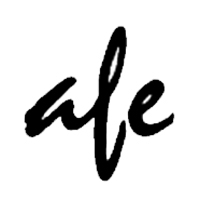
AM :: Yes, of course, I played my very first concert in 1997. Since then my concerts are mostly improvised, so I find it very useful to have lot of equipment to choose according to the ideas that come to mind when I am on stage. I use some thirty devices in total, the biggest being a Korg MS20 synthesizer and the smallest an Ibanez Delay pedal. Unfortunately I never had the chance to play abroad, I would really like to.
TJN :: Your piece de resistance – Breaking Down the Barriers 1995-2005, – quite an undertaking with more than 250 artists involved. And it’s a free download? I am more than just slightly curious how you mastered this process.
AM :: During the last year, approaching the label’s tenth birthday, I was thinking about some good ways to celebrate. The idea of a free downloadable mp3 compilation slowly took shape and so I started contacting all the people who had a release on Afe. Then it was the turn of all my other friends / musicians spread across the world. In the end I received about 400 tracks made by more than 250 international musicians / bands including: Amir Baghiri, Aidan Baker, Bestia Centauri, Maurizio Bianchi, Steve Brand, Caul, Yannick Dauby, Deison, Dronaement, Andrew Duke, Fear Falls Burning, Frog Pocket, John Hudak, Brian Lavelle, Andrew Liles, Francisco Lòpez, Lionel Marchetti, Lasse Marhaug, Parallel, Retina.It, Mathieu Ruhlmann, Jos Smolders, Telepherique, Rafael Toral, Troum, True Colour Of Blood, The Use of Ashes and many, many more… The biggest satisfaction was that only seven people replied with a “No, thank you.” to my request. On a personal level it was great to have so many people participating; I can see it as a big and warm demonstration of affection for me and the label.
TJN :: That certainly goes with your overall modus operandi. What is your take on an international sound in electronic music? I mean – do you hear any similarities in works from all over the place? You represent many Italian artists, which is not happening in other parts of the world, and are one of the sole places to find it. Are there auditory differences to compare and contrast?
AM :: Uhm, I don’t think that there’s a sort of easily recognizable “Italian experimental sound” that exists, Italian experimental musicians deal with different aspects of experimentation just like musicians all over the world. Every country hides some treasures and I think that – generally speaking – Italian musicians can easily “compete” against their foreign colleagues. The main problem is that there is a strong lack of “culture” and curiosity among the Italian public, there are not many resources (labels, venues, etc.) for experimental electronic music in Italy if we exclude those available to the “academic world”. Good foreign labels like Häpna and Baskaru have recently released CDs by many Italian musicians, this is a good sign that nice experimental music is made in Italy, even thought most of Italian people don’t care about it.
TJN :: Speaking of which – I was JUST listening to the latest by Giuseppe Ielasi on Häpna! Since the 90s the term “alternative” has been an adopted ism when describing music. Of course some wonder “alternative to what… Avril Lavigne?” How would you describe the overture of Afe?
AM :: Ehi, I had to do a Google search to learn who Avril Lavigne is… I usually don’t listen to the radio and I don’t watch TV. I’m completely out both of current mainstream and “alternative” too… Afe is a very small label and – quoting my own writing on the Afe website – its only aim is to break down the barriers existing in electronic music and its efforts are addressed to all the fearless / open-minded listeners who will be able to get over the terrible shock of seeing such extremely different productions standing side by side. That’s all.
TJN :: I am glad you have your protective bad culture shield in effect. I wish us Americans were as lucky, but the crap is pumped into restaurants, gyms, subways, supermarkets, mediocrity – it’s subliminal brainwash. I have taken to wearing an iPod most of the time. Who are your very favorite artists… and guilty pleasures?
AM :: Well, the only musical style which I completely dislike is Opera, the rest is almost fine with me, but of course I have some favourite artists / bands and so many “guilty pleasures”: my brother raised me with a lot of Pink Floyd, Genesis and prog rock in general, then in the early ’80s I fell in love with David Bowie’s Berlin Trilogy (Low, Heroes, Lodger) and english Electronic Pop / New Wave (Howard Jones, Depeche Mode, Tears For Fears, Soft Cell, Thompson Twins, etc.). Shortly after I discovered The Durutti Column which instantly became – and still are – my favourite band ever. I explored almost the whole Factory catalogue and then I passed to Mute Records (Fad Gadget, Yazoo, Nitzer Ebb, etc.). In the early ’90s, thanks to The Grey Area of Mute, I discovered the Industrial music of Throbbing Gristle, SPK, Laibach, Non / Boyd Rice, etc. Then it was the turn of more Experimental / Ambient acts like Cranioclast, F:A.R, Alio Die, Vidna Obmana and Robert Rich. At the same time I was reached by the early Warp / Rephlex / Fax releases of music by Aphex Twin, Autechre, B12, Reload, Black Dog, Luke Vobert, etc. My favourite IDM artist has always been Mike Paradinas a.k.a. Mu-Ziq, Jake Slazenger, Gary Moscheles… Some years ago I discovered with great pleasure the Black Music masterpieces of the ’70s: Barry White, Isaac Hayes, Stevie Wonder, Curtis Mayfield… Among my other favourite musicians I can’t help to mention The Smiths, Vangelis, Lustmord, Einstürzende Neubauten, The Orb, Paul Schütze, Fra Lippo Lippi, Brian Eno, The Cure, Barry Adamson, The Style Council, Psychic TV, Jimi Tenor, Pan Sonic, Klaus Schulze, Kraftwerk, Philip Glass, Penguin Cafè Orchestra, Cabaret Voltaire, Belle & Sebastian, The Comsat Angels, La Düsseldorf, Tangerine Dream, Bad Sector… OK, I guess this is enough, sorry for the long list.
TJN :: No way – I could keep on listening forever (hmmm, I think I will). Actually, we have about the same level of passion for music; it’s great to see it’s truly universal. Thanks for taking some time to chat. It’s been real, it has. Do you have any last minute thoughts to share with all those people out there?
AM :: I would like to invite them to have a look at the Afe website, especially to the “mp3” section: there are more than 250 selected Afe tracks available for download, they can get a better idea of what Afe is all about listening to the music. Thanks for your questions; I’m glad we did this interview, ciao!
For more info about AFE Records, visit their website here.






